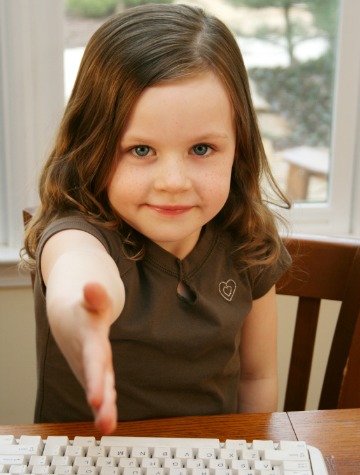
Good manners help teach empathy
Emily Post might have been on to something. Beyond the social niceties of “please” and “thank you,” basic manners actually serve as the building blocks for the development of empathy in young children by encouraging awareness for the feelings of others and decreasing ego-centrism.
Etiquette aside, basic manners do more than raise polite children who impress your neighbors. Good manners promote good values such as consideration, appreciation, responsibility, respect and empathy.
What is empathy?
Empathy differs from sympathy. While sympathy is feeling sorrow or concern for someone else, empathy is the ability to identify with and understand another person’s feelings and motives without necessarily having experienced them yourself. Though some may say certain children are born with this capacity, most experts agree empathy is a skill that can be nurtured and developed whether or not a parent sees a natural inclination.
More than magic words
Young children are inherently ego-centric. As they develop, they begin to distinguish ‘self’ from ‘others,’ and this is a prime opportunity for parents to encourage empathic thoughts and behaviors. Manners are a simple yet critical tool in helping a child develop empathy since, by their very nature, manners are the outward expression of appreciation and consideration for another.
Please, thank you and excuse me. Use these magic words everywhere, especially at home with each other. There is no better company on which children can practice than their own family. These seemingly simple words teach children to consider another’s generosity, feelings or time through simple recognition and thankfulness.
Offering help. Life is the best teacher. A ripped bag spilling items to the floor, a woman with a double stroller trying to get through the door — all of these daily incidents are great opportunities for children to help. Pointing out these opportunities and encouraging them to offer assistance will, over time, become internalized. They will be more apt to notice these moments in the future and take the initiative to help independently.
Appropriate greetings. Properly greeting someone when arriving and departing should not be an overlooked manner. Even if children are busy playing, it is important to have them give their greetings using good eye contact. This instills not only an awareness of other people’s feelings but also helps to practice basic social skills.
Thanking a person for their gift. A thank you card, email or phone call fosters a sense of gratitude and appreciation essential to developing empathy. Even young children not yet able to write can draw a picture or participate in a phone call. Recognizing the gift-giver helps discourage the dreaded “spoiled” or entitled attitude by simply reinforcing appreciation over expectation.
Tips for getting the most out of manners
- Repetition: Don’t let manners slide when the guests are gone. If a child isn’t expected to show mannerly and respectful behavior and language with you at home, your efforts will be notably diminished and their success outside of the home limited.
- Consistency: Like any learned behavior, manners must be introduced as early as possible and reinforced consistently. No child is ever too young to begin practicing manners.
- Modeling: Children follow the example set by adults, so always model good manners yourself both inside and outside the home, especially when addressing your own children and spouse.
- Meaning: Manners can become a rote, mindless drill so it is important to relate the meaning behind the manners regularly. Try to focus on how good the manners made someone else feel not just insisting your child parrot back the magic words.
More about manners
Why manners matter
When mom has a potty mouth
How to teach your toddler table manners